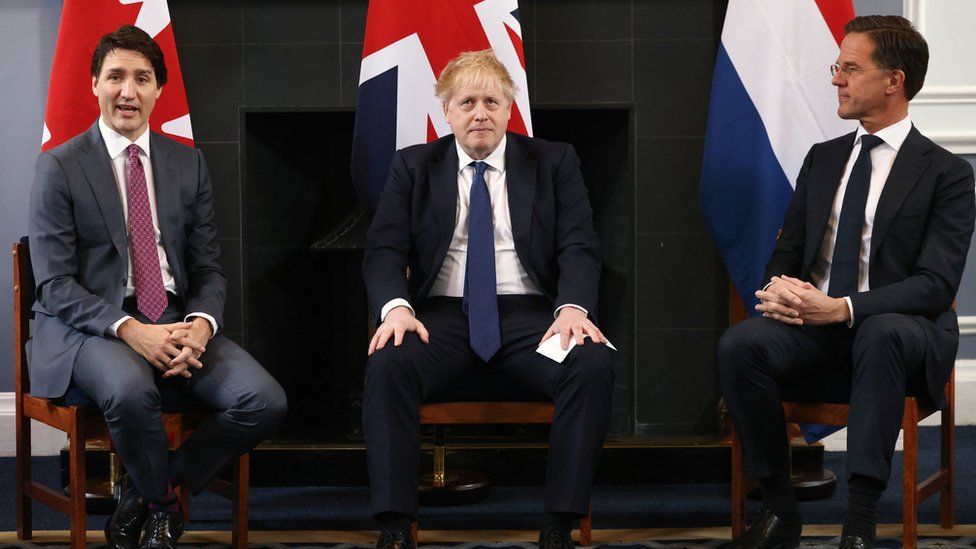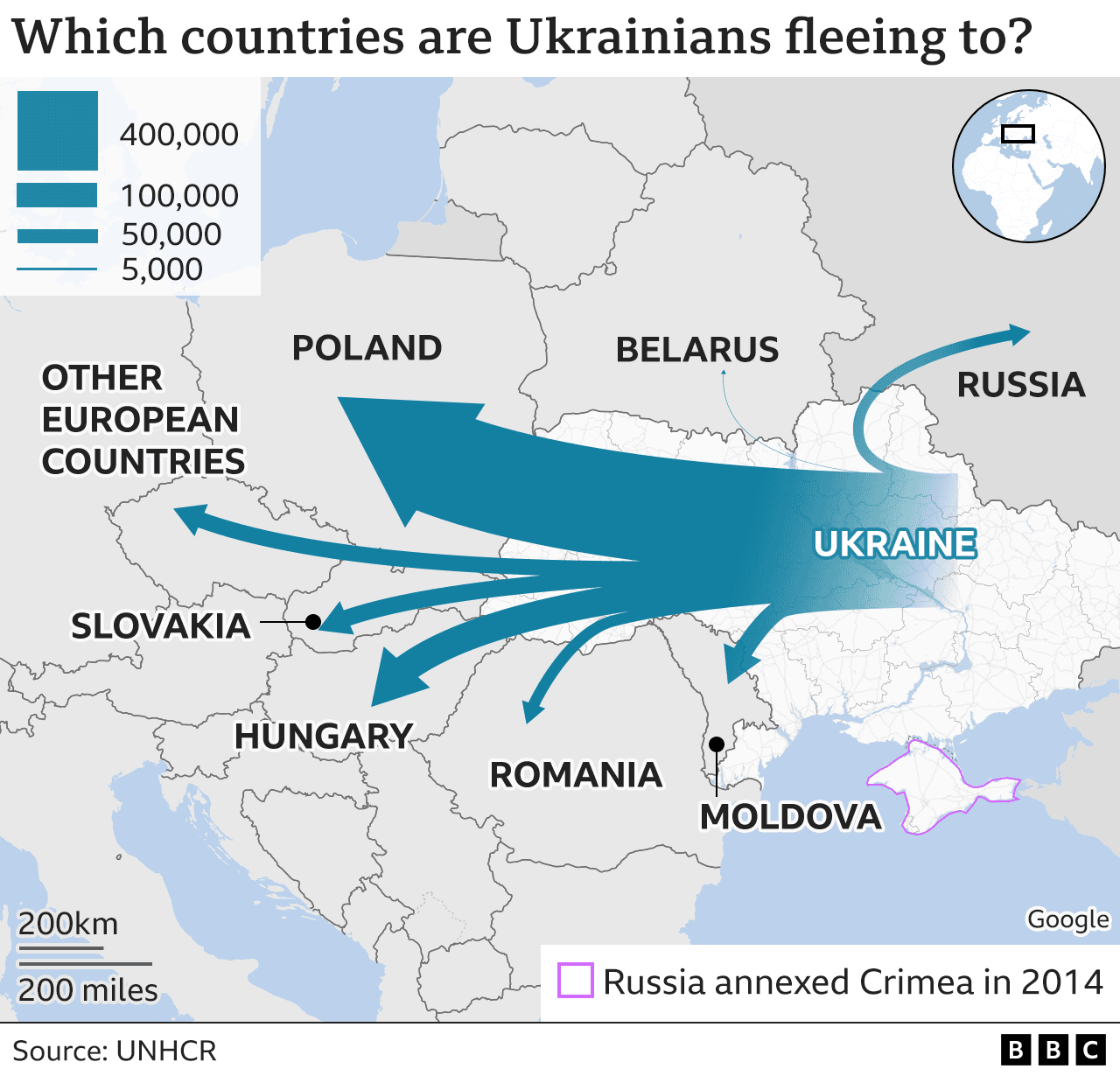Ukraine war: PM holding talks with world leaders on further sanctions
Boris Johnson is holding talks with the Canadian and Dutch prime ministers in London, as Western powers prepare to agree further sanctions on Russia.
But the government's refugee policy is coming under scrutiny after it was confirmed over the weekend that about 50 Ukrainians had been granted visas.
Boris Johnson said the UK would be "very generous" to refugees but would not let people in without any checks.
It comes amid calls to do more as Russia's invasion of Ukraine continues.
Mr Johnson will discuss further sanctions against Russia with Canadian Prime Minister Justin Trudeau and Dutch Prime Minister Mark Rutte during their talks.
Parliament is also expected to pass legislation targeting money laundering by oligarchs close to Russian President Vladimir Putin.
Ukrainian cities have continued to suffer intense shelling, with officials saying Russian forces are targeting hospitals, nurseries and schools, and with residents caught up in the assault.
Russia says it will open up humanitarian corridors in several areas on Monday - after two previous attempts to evacuate civilians collapsed.
The corridor from Kyiv will lead to Russian ally Belarus, and civilians from Kharkiv will only have a corridor leading to Russia. Corridors from the cities of Mariupol and Sumy will lead both to other Ukrainian cities and to Russia, the AFP news agency reports.
Peace talks are also set to resume between the two sides and their respective foreign ministers will meet in Turkey.
During a visit to an RAF station with his fellow leaders, Mr Johnson said he was not sure about the accuracy of the 50 visas figure but said the UK was "processing thousands".
He said there were two "very generous" routes to the UK already but said Mr Putin was "doubling down on his aggression" and was attacking "in a pretty indiscriminate way" which would displace huge waves of people - adding that "we're going to have to respond to that".
Asked whether the government was considering a third option for refugees, he did not answer directly but said the UK would not create a system "without any checks or any controls at all".
 Image source, PA Media
Image source, PA MediaHome Office sources have said they are in the early stages of exploring a scheme to provide humanitarian access to people fleeing the conflict.
But a senior government source told the BBC the focus was still the two schemes for Ukrainian refugees that have already been announced, and the need for further action was being kept under review.
The prime minister's official spokesman also insisted there were just two humanitarian options, with more details on the sponsorship route to be released later this week.
Ahead of talks with the other leaders, Mr Johnson said he thought there was more that could be done internationally to remove Russia from the Swift banking payment scheme.
The prime minister also said that with Mr Putin's "unrestrained" attacks on cities, there was more the world could do on sanctions, which was why the UK was bringing forward the Economic Crime Bill on Monday.
He added that "we want to go as fast as we possibly can" in imposing sanctions - with "nothing off the table".

More than 1.5 million people have fled Ukraine since the invasion began, according to the UN refugee agency.
As of Sunday about 50 Ukrainians - about 1% of the 5,535 people who have applied - had so far been granted visas under a scheme for refugees with family links to the UK, the Home Office said.
On Monday there had been more than 10,000 applications from Ukrainians for visas but No 10 was unable to say how many had been granted or rejected.
The UK has steadily increased its visa offer to refugees from the war and Home Secretary Priti Patel said she was "doing everything possible" to speed up efforts to issue the travel permits.
Europe minister James Cleverly said the government would make the process "as quick, easy and as fast as possible" but said "initially it will be slower than we would like".
Mr Cleverly said Russia's latest offer of a ceasefire - the third so far - was "cynical beyond belief" as most of the escape routes went into Russia or its ally Belarus.
Meanwhile, the Economic Crime Bill, which MPs will vote on later, aims to make it easier to sanction individuals.
In recent days, the government has announced asset freezes and travel bans on a number of oligarchs - but has faced accusations of being too slow to sanction those with links to President Putin.
The bill will set up a new register that will mean foreign owners of UK property must declare and verify their identities with Companies House.
In addition, new measures will provide UK authorities with more time to carry out investigations, as well as giving them protection from prohibitive legal costs.
MPs are expected to vote through all stages of the bill in a single sitting.

War in Ukraine: More coverage
- LIVE: Latest updates from on the ground
- IN KYIV: Locals fear another Grozny or Aleppo
- ANALYSIS: Europe finally steps up
- EXPLAINED: Why Putin has invaded Ukraine?
- IN DEPTH: Full coverage of the conflict

Foreign Secretary Liz Truss said the bill would "give us the chance to bring even more crippling sanctions against Putin and his regime".
Labour said it would support the legislation, but wanted the proposed timeframe for property owners to register to be cut from six months to 28 days.
Conservative MP David Davis has tabled an amendment to the bill which would prevent anyone who the government is considering sanctioning from selling or moving assets out of the UK.
The UK has also announced £74m in extra financial help for Ukraine, which will be provided by the UK through the World Bank.
It could go towards supporting public sector salaries, allowing key state functions to keep operating, or supporting social safety nets and pensions and is in addition to £220m pledged already.
On Monday, the Disasters Emergency Committee announced its Ukraine appeal had raised more than £100m in four days.



No comments